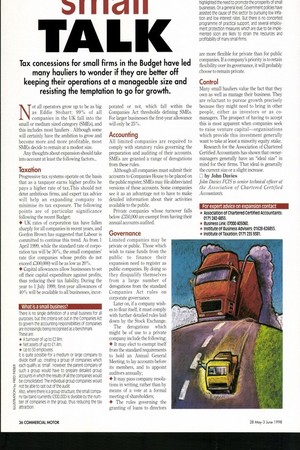WI I I CI 1 I TALK Tax concessions for
Page 40

If you've noticed an error in this article please click here to report it so we can fix it.
small firms in the Budget have led many hauliers to wonder if they are better off keeping their operations at a manageable size and resisting the temptation to go for growth.
Not all operators grow up to be as big as Eddie Stobart: 99% of all companies in the UK fall into the small or medium sized category (SMEs), and this includes most hauliers . Although some will certainly have the ambition to grow and become more and more profitable, most SMEs decide to remain at a modest size.
Any thoughts about expansion should take into account at least the following factors...
Taxation Progressive tax systems operate on the basis that as a taxpayer earns higher profits he pays a higher rate of tax.This should not deter ambitious firms, and expert tax advice will help an expanding company to minimise its tax exposure. The following points are of particular significance following the recent Budget: • UK rates of corporation tax have fallen sharply for all companies in recent years, and Gordon Brown has suggested that Labour is committed to continue this trend. As from 1 April 1999, while the standard rate of corporation tax will be 30%, the small companies' rate (for companies whose profits do not exceed £300,000) will be as low as 20%.
• Capital allowances allow businesses to set off their capital expenditure against profits, thus reducing their tax liability. During the year to 1 July 1999, first-year allowances of 40% will be available to all businesses, incor porated or not, which fall within the Companies Act thresholds defining SMEs. For larger businesses the first-year allowance will only be 25%.
Accounting All limited companies are required to comply with statutory rules governing the preparation and auditing of their accounts. SMEs are granted a range of derogations from these rules.
Although all companies must submit their accounts to Companies House to be placed on the public register, SMEs may file abbreviated versions of these accounts. Some companies see it as an advantage not to have to make detailed information about their activities available to the public.
Private companies whose turnover falls below £350,000 are exempt from having their annual accounts audited.
Governance Limited companies may be private or public. Those which wish to raise funds from the public to finance their expansion need to register as public companies. By doing so they disqualify themselves from a large number of derogations from the standard Companies Act rules on corporate governance.
Later on, if a company wishes to float itself, it must comply with further detailed rules laid down by the Stock Exchange.
The derogations which might be of use to a private company include the following: • It may elect to exempt itself from the standard requirements to hold an Annual General Meeting, to lay accounts before its members, and to appoint auditors annually; • It may pass company resolutions in writing, rather than by means of a vote at a formal meeting of shareholders; • The rules governing the granting of loans to directors highlighted the need to promote the prosperity of small businesses. On a general level, Government policies have assisted the cause of this sector by pursuing low inflation and low interest rates. But there is no concerted programme of practical support, and several employment protection measures which are due to be implemented soon are likely to strain the resources and profitability of many small firms.
are more flexible for private than for public companies. If a company's priority is to retain flexibility over its governance, it will probably choose to remain private.
Control Many small hauliers value the fact that they own as well as manage their business. They are reluctant to pursue growth precisely because they might need to bring in other people, either as investors or as comanagers. The prospect of having to accept this is most apparent when companies seek to raise venture capital—organisations which provide this investment generally want to take at least a minority equity stake.
Research for the Association of Chartered Certified Accountants has shown that ownermanagers generally have an "ideal size" in mind for their firms. That ideal is generally the current size or a slight increase.
D by John Davies John Davies FCIS is senior technical officer at the Association of Chartered Certified Accountants.
What is a Small business?
There is no single definition of a small business for all purposes, but the criteria set out in the Companies Act to govern the accounting responsibilities of companies are increasingly being recognised as a benchmark. These are: * A turnover of up to £2.8m; * Net assets of up to E1 .4m; * Up to 50 employees.
It is quite possible for a medium or large company to divide itself up, creating a group of companies which each qualify as 'small'. However, the parent company of such a group would have to prepare detailed group accounts in which the results of all the companies would be consolidated. The individual group companies would not be able to opt out of the audit.
Also, where there is a group structure, the small company tax band (currently £300,0001 is divisible by the number of companies in the group, thus reducing the tax attraction.






















































































































